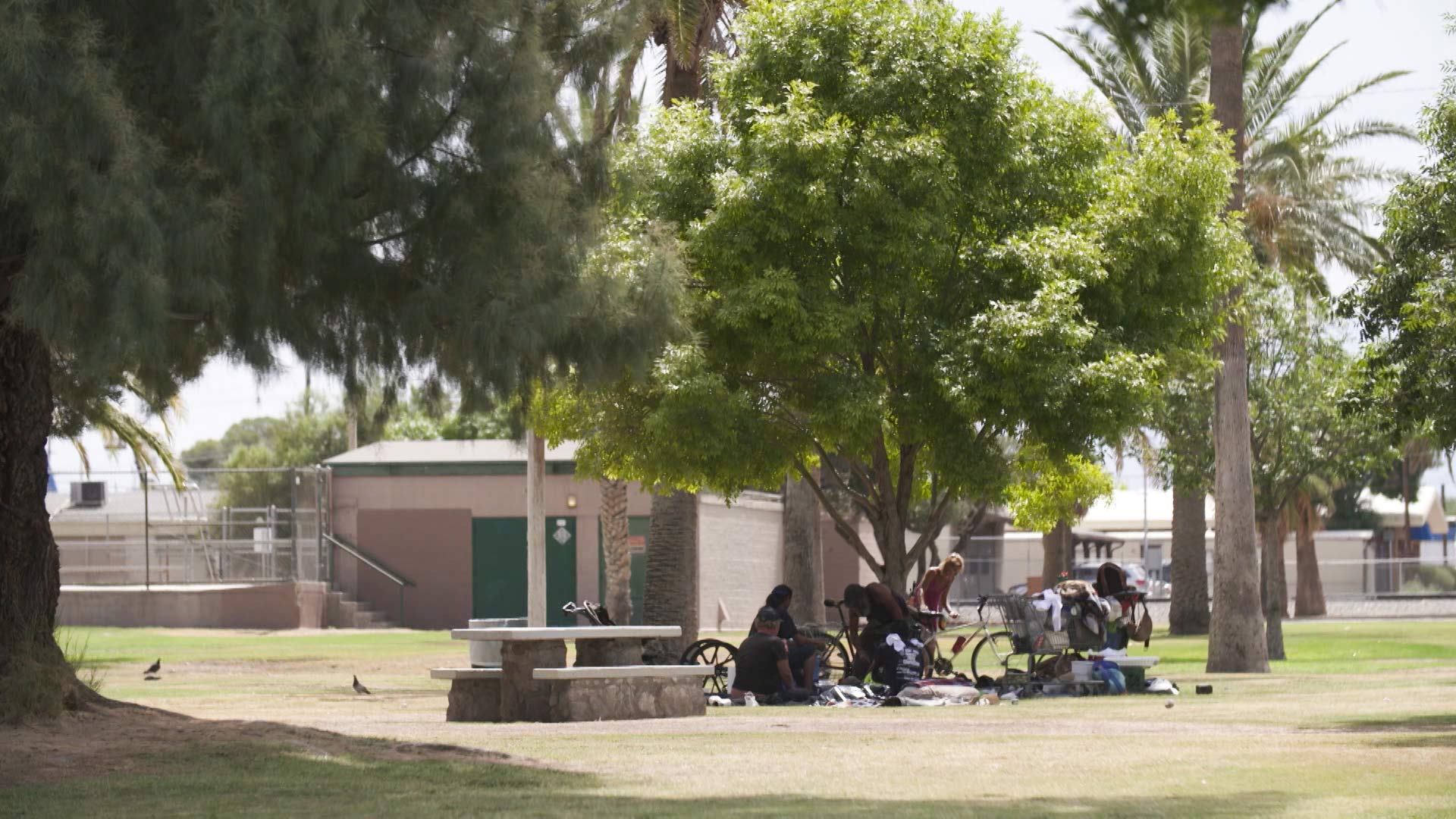 A group hangs out in the shade in Santa Rita Park in Tucson.
A group hangs out in the shade in Santa Rita Park in Tucson.
The Buzz for November 17, 2023

If you followed Tucson's most recent city election, it was hard to avoid mentions of Housing First. The model that provides low-to-no barrier housing for unhoused people was a frequent topic of debate.
Tucson's incumbent Democrats frequently touted the success and expansion plans for housing first efforts.
"We created a program housing first, that is an evidence based program that we did not have there and it's a piece of the puzzle," Mayor Regina Romero told AZPM. "It's not a silver bullet. It is a program that had never been instituted in the history of the city of Tucson."
But opponents were quick to dismiss the program while saying it did not work.
"Tucson has a reputation of giving away free services, free phones, free medical free food free homes now, and well you know, free, free free that's a Portland attitude," said independent mayoral candidate Ed Ackerley.
"There's no expectation that they're sober, that they remain clean," said Republican mayoral candidate Janet Wittenbraker. "There is no expectation for mental health. The idea is you provide shelter first and then then they'll gravitate towards those things. That has failed."
The elections were a clean sweep for the incumbent Democrats, which likely means the continuation of Housing First initiatives.
So how do experts in the field feel about Housing First as a model to help the unhoused?
"We're to the point where if people don't want to do Housing First, then I have to question how important the issue of homelessness really is to them," said Steve Berg, Chief Policy Officer for the National Alliance to End Homelessness. "The public understands that it's mainly a housing issue they see the cost of housing. They think, 'well for somebody who's like been living on the streets and has a not very good job history, it's got to be even worse."
Berg said the biggest reason for a growing homelessness issue a lack of affordable housing that dates back to the post-World-War-II era.
"“Homelessness is caused by not enough housing at levels that people with the lowest incomes can afford. Who is homeless? That’s more a question of issues like mental health. The reason there’s so much homelessness, is very much an issue of housing.”
That is one area where Housing First critic Judge Glock agrees.
"Affordable housing is certainly a problem for homelessness in general. There's a real tight connection that you see across cities with higher housing costs are going to see more homelessness," he said. But if you look at it, the main problem tends to be in the sort of short-term or sheltered homeless population. Those populations are the ones that are usually homeless for short periods of time; they usually need a hand up to get on with their lives. But Housing First, ironically, is aimed at the chronic homeless."
He said people who are chronically homeless often have mental health and addiction issues, which are often a bigger hangup than having the financial ability to support themself.
Glock advocates for a system similar to what is in place in Las Vegas, where government has established a sanctioned urban camping area that provides public restrooms, some protection from the elements, security and services.
"Portland, Ore. is doing something similar. The city that once was a byword and still to some extent is for the homelessness crisis said they're going to ban street camping categorically within the next year and their alternative is setting up these sanctioned camping areas."
Glock said the issue is that Housing First offers people what is often one of their biggest expenses for free, and thus giving them no reason to leave. He said people often stay for extended periods, thus meaning that for every new person who becomes homeless, a new permanent supported house has to be set up.
The idea that people do not leaving Housing First is something that Sarah Hunter, Director of the RAND Center on Housing and Homelessness agrees with.
Her organization was commissioned to study Pima County's Housing First program after its first two years. It found that more than 80% of those who enrolled in the program were still in it a year later.
Despite that noted expense, though, it still helped save taxpayer dollars.
"So even taking into account the cost of the housing and supportive services, it's still cheaper to taxpayers to invest in this program than to let people linger on the street, because what happens is they then cycle in and out of the criminal justice system, the emergency room and crisis mental health services, which are very expensive."
She said that targeting Housing First at a population who often are more likely to incur such public expenses could be a good way to make such programs worth the expense.
"[Pima County was] implementing it with a population that had more criminal justice involvement than what you typically see in these programs. It's wise to kind of look at who is succeeding and who's failing in the program so they can tailor it as they move forward to provide this intervention to the best participant like someone is going to succeed."


By submitting your comments, you hereby give AZPM the right to post your comments and potentially use them in any other form of media operated by this institution.